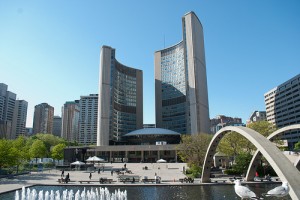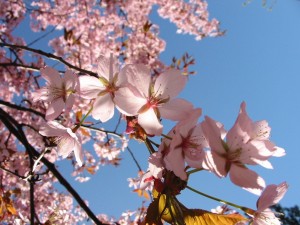We’re pretty disappointed that members of the municipal government in our hometown, Toronto, are pushing to step away from their buy local food policy. It seems very shortsighted to curtail a policy that is good for the health of our citizens, good for the planet, and helps local food producers – simply to “get the biggest bang for our buck”.
If you’d like to send a message to City Hall on this issue, the good folks at Toronto Environmental Alliance have put a petition online you can sign by clicking here.
Thanks to David Newland, of Roots Music Canada, for contributing this post.
With the celebration of springtime fully upon us, many folks are taking this time to count their blessings.
For me, two of the most important ones are food, and music. Both are nourishment: food for the body, music for the soul.
On weekend mornings, I love to head to my local farmer’s market whenever my schedule allows. I take a set amount of money out of the bank, grab my canvas shopping bags and a good strong coffee, and saunter off to browse through the wares.
What I’m looking for, I’ve realized, is not so much the basic sustenance my body needs – I could get that anywhere, and cheaply. The reason I go to the market is that I am seeking nourishment beyond nutrition.
Food that’s locally grown, for example, is important to me. So is being able to have a conversation with the person who produced it. So is knowing as much as I can about what goes into the food, the practices used to grow or raise it, the philosophy of the vendor, and so on.
At my local market, there’s more than food. There are crafts, there are activities for the kids, there’s nature, community, art, and education. Oh – and there’s a girl who plays the fiddle. Throw her a couple of bucks and she stops to thank you. When she’s not there, it feels like something is missing.

And that makes sense. Music and food, these these two basic blessings, share so much in common. Both are easily found – most people reading this post have more food, and more music, than they need. Yet both are frequently found in a form so watered down, the higher value has been lost. You can buy mass-produced music, just as you can buy mass-produced food, and it will perhaps fill your basic entertainment needs.
But the equivalent of a community market is where they both belong.
Mass production is to music as factory farming is to food. Perhaps a necessity, certainly a reality of ordinary life – but not the only way to experience this bounty.
It’s another thing entirely to enjoy music being played live in a decent environment, to shake hands with the artist, to hear your own concerns expressed, to feel your values have been respected, to appreciate the work that goes into making it, and to feel you are working with the artist – just as you might work with a farmer – in partnership around this great sustaining nourishment of the soul.
Music and food, mindfully made, are a natural pair.
Add family and friends and you have all the blessings of a perfect spring holiday weekend.
Here’s hoping you enjoy yours in happiness and health, in body and in spirit.
It’s spring, right? And you want to know what’s in season in Ontario now.
Veggies:
Beets, cabbage, carrots, greenhouse cucumbers, greenhouse lettuce, mushrooms, onions, parsnips*, greenhouse peppers, rutabaga, sprouts, sweet potatoes and greenhouse tomatoes.
Fruits:
Apples and rhubarb.
According to Foodland Ontario, the above foods are “scheduled” for April. But with the slow spring we have this year, it might be better to expect them to arrive closer to May. All the same, it’s almost May so keep an eye out!
*Not a parsnip fan? Try this recipe given to me by my old CSA, La ferme de Bullion, in Québec. It’s surprising how eating a good-for-you, local food prepared in a new way can make you feel like a super star.
Parsnip Pancakes
4 cups parsnip peeled and cubed
2 eggs slightly beaten
1 onion finely chopped
1 tsp salt
1 tsp oil
1/2 cup finely chopped walnuts
1 tsp dried tarragon
2 cups breadcrumbs
Steam parsnips until tender (10-15 mins). Sauté onion in oil, add tarragon.
Mash parsnips; add onion, egg, salt and nuts and mix well. Form into 12 patties.
Coat with breadcrumbs. Bake at 350F for 20 minutes.
Mmm mm.
(Ontario garlic might make a good addition too.)
Ever heard of the Doomsday Vault?
The Svalbard Global Seed Vault is located on the remote island of Spitsbergen, Norway. It’s a backup should anything happen to seeds currently being saved in traditional genebanks — a type of safety net against loss of diversity.
Sounds like a good enough idea, right? If calamity strikes, be it natural or man-made, we have something to go to, a plan B.
But as Genevieve Grossenbacher of Seeds of Survival, mentioned at the 2011 Organic Grower’s Conference, who is going to have access to those seeds in an eventual disaster?
Will you? Not likely. Nor will I.
With the free exchange of seeds now being further threatened by Canada’s Comprehensive Economic Trade Agreement with the EU (more on CETA at the National Farmers Union), it’s high time we expand our love of local food to include local seeds.
Local seeds are adapted to the local environment. They have evolved over thousands of years to grow and flourish in a specific location with specific growing conditions. Local seeds produce the best, most resilient, most nutritious local food and are the best seeds to plant -– and to save.
It’s spring. Plant your herbs and your veggies, but plan to save a few seeds from your harvest for next year. All you need is an empty clean jar.
More info on seeds and seed saving:
Seeds of Diversity
Guelph Centre for Organic Farming
Urban Harvest
It’s another new year and some of you might have decided to entertain a resolution or two. After avoiding such things for the past several years, I decided to creep into 2011 on a quieter, more contemplative note and have come up with a few priorities for myself.
On the topic of changing habits, and of course, more specifically, food habits, check out the TedxHart House lectures of last month, The Future of Food.
Jason Qu, recent graduate and coordinator of U of T’s campus agriculture program, discusses campus food initiatives, and suggests a more holistic approach to food is the starting point that will stick.
The Secret Classroom
Lauren Baker, Director of Sustain Ontario, discusses changing the farming system and creating more opportunities for the little guy. Here, here!
10 Good Food Ideas
I can’t find the lectures of the other speakers, Dan Donovan (chef and product developer for Ontario’s Own), and chefs Jeffrey Crump and Bettina Schormann, of Ancaster Mill.
If anyone has those links, please share!
Bonne année!
Ever been to the Greenmarket at Union Square in NYC?
They got it goin’ on.
I had the pleasure of visiting this market a few days ago and, chatting with one of the GrowNYC reps, I learned that it has been around since 1976.
What struck me about this market, I mean, aside from being open an impressive 4-days a week, year round, and hosting over 140 different local suppliers who provide New Yorkers with picked-that-day-or-the-day-before fruits and vegetables, it was that this market was situated right downtown in the middle of all the action.
Any farmer’s market I’ve ever seen has been sequestered away in a residential neighbourhood, often with operating hours that only the stay-at-home can adhere to.
But the Union Square Greenmarket sits right there like an icon to grassroots urban development; in a previously crime-ridden neighbourhood, this market now holds its own amongst office towers, megastores and trendy boutiques.
No doubt there is a price tag attached to this convenience, but the place is packed! Proving that movers & shakers, students, chefs, hipsters, neighbours and tourists are willing to rub shoulders and strike up some small talk all for the sake and the pleasure of eating some real food.
This is a market that is located where the people are.
If you’re in NYC, do check it out. This is how it should be.

Not far from the Tree’s fruit picking program organizes volunteer groups in Toronto to harvest fruit from trees on residential properties that would otherwise go to waste.
If you have a fruit tree that yields more than you can handle, consider calling these guys to come pick the fruit and put the unwanted bounty to good use.
One third goes to the fruit tree owner, one third goes to the volunteer pickers, and one third goes to community organizations in the neighbourhood.
And Not Far from the Tree is sharing their return with the public tonight as part of the Gladstone’s Fly by Night exhibition for Nuit Blanche. Starting at 6:57 pm today, they’ll be pressing apple cider from dusk till dawn.
Enjoy a cup of local love … a tireless cider-pressing extravaganza that animates the urban orchard!
Snap snap!

?”If you wish to make an apple pie from scratch, you must first invent the universe.”
– Carl Sagan
If you don’t have time for that universe inventin’ stuff, pick up some ready-grown apples at your local market and get busy.
Here’s a little guide to help you choose the right kind of apple for your needs:
Cakes, Pies, Crisps/Pudding, Skillet
Northern Spy, Spartan, Empire, Cortland, Gala, Banana gold, Idared
Baking whole
McIntosh, Empire, Spartan, Northern Spy, Jonagold, Mutsu
Sauces
McIntosh, Gala, Empire, Northern Spy, Spartan, Cortland, Gravenstein
Snacks, Salads
McIntosh, Gala, Golden Russet, Red Delicious
I haven’t had the chance to sample every single variety of apple out there, yet, but so far it tastes like a damn fine year for McIntosh.
Not very original, I know, but crisp, juicy, sweet, with a touch of tart.
 Keep your eye out for the LocalFoodPlus logo.
Keep your eye out for the LocalFoodPlus logo.
LocalFoodPlus is a Canadian non-profit that certifies local sustainable food producers. The LFP stickers and in-store promotional labels help you identify which items are both local and sustainable—meaning they come from the local farmers who use few or no nasty chemicals, treat their animal well, conserve soil and water, and protect wildlife.
Really, these are the good guys. And you want to support them.
LFP got started back in 2006 when they launched a program with U of T that made the university the first on the continent to formally commit to purchasing only locally produced food for their St. George campus cafeterias and residences.
Today they’ve come a long way and have an impressive win-win-win program that helps the farmer, the retailer and the consumer benefit from the growing demand for local & sustainable food.
And while LFP helps shoppers like us identify the super star local food items on store shelves and at markets (hooray for stickers!), the program also helps farmers see the advantage of adopting sustainable production practices, provides 3rd party certification to back up their claim, helps farmers connect with new markets and vendors, and provides promotional marketing through their website and newsletter, as well as in-store differentiation.
Love these guys. Check them out yourself for more info.
This inspiring couple have been livin’ the LocalFoody dream by working hard and delivering the fruit of their labour to select establishments in Toronto, including Multiple Organics, The Atlantic, Grace, Bohmer, Enoteca Social, Marben and CowBell.
Check out their adventures on Grant’s blog at theveglesstravelled.
Keep ’em coming, Grant!






